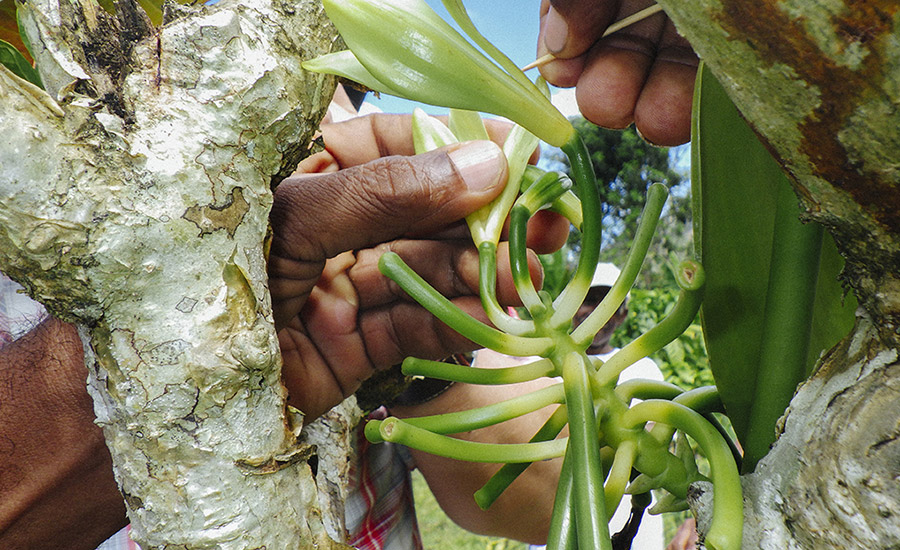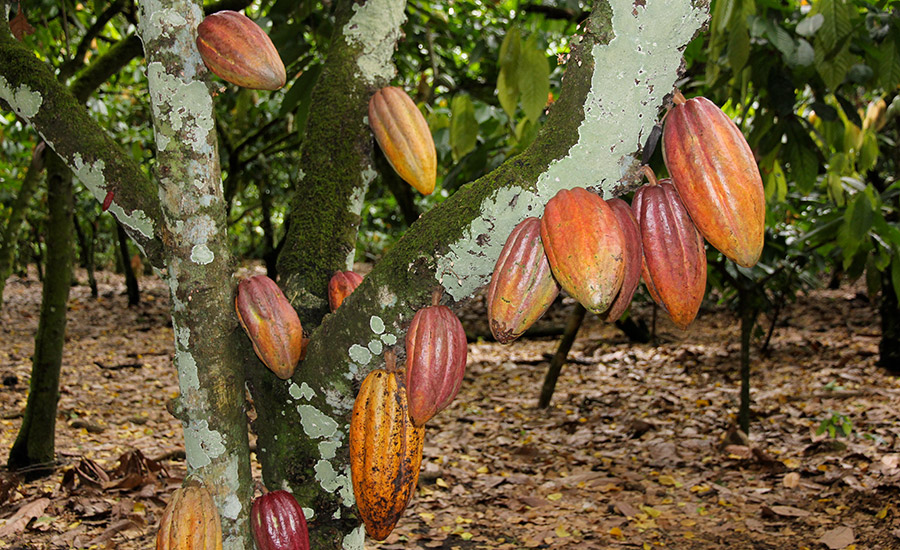Sustainable relationships with farmers, accurate record-keeping key to ingredient traceability
Reducing food waste, government regulations, data integrity at the apex of food traceability and food safety.

Food companies have until Jan. 20, 2026, to comply with Food Traceability Final Rule (FSMA 204), which is designed “to help identify contaminated food faster, remove it from the market quickly, and reduce foodborne illnesses and deaths,” the FDA says.
Photo courtesy of Global Organics.
Achieving ingredient traceability depends on many factors such as longstanding, sustainable relationships with farmers and suppliers, accurate data collection and record keeping, as well as the type of raw material needed. These factors are key to preventing food recalls and assuring the foods we eat are safe and healthy.
Experts note that it makes good business sense for dairy processors to do all they can to ensure that ingredients used within dairy products like milk, cheese, ice cream, yogurt and cottage cheese can be sourced back to the land where they’re grown. And consumers also want more transparency about the foods they’re eating and drinking.
Sara Bratager, senior food safety and traceability scientist at the Chicago-based Institute of Food Technologists (IFT), explains that while some elements of traceability are straightforward, others present considerable challenges. The ease or difficulty can differ not only between organizations but also within different parts of the same organization, she adds.
The ease of traceability also depends on the product. “For instance, traceability might be easy to implement for one product line but extremely challenging for another, reflecting the diversity and variability of food products and ingredients,” she explains. “Each type of product may require unique information, methods and tools for effective tracking and tracing. Existing regulations and industry standards often mandate the recording of traceability-related data, making continued compliance relatively ‘easy’ for many organizations.
“However, as we move toward digitization and interoperable data sharing, we encounter new challenges. The lack of interoperability among the various systems and platforms used by farmers, processors, distributors, retailers and regulators is a significant obstacle,” Bratager continues. “Each actor in the supply chain might use different systems, complicating seamless data sharing. These challenges necessitate the adoption of tools and software, coordination with supply chain partners, and collaboration with technology providers.”
Brian Nash, vice president of corporate sustainability at Ingredion, suggests that the ability to “track and trace” ingredients back to the original source is heavily dependent on the ingredient in question.
“For example, ingredients made from certified non-GMO corn, which requires a full traceability program to achieve that certification, is very simple. Contrast that, however, to ingredients made with regular dent corn purchased on the open market,” Nash explains. “Traceability back to the grain elevator is relatively simple, but it is extremely difficult to impossible to track the regular dent corn back to the individual farm from there.”

The Westchester, Ill.-based ingredient supplier helps its customers understand that transparency and traceability that goes back to the raw materials being sourced is an important first step. “This allows a dairy company to map out their supply chain, understand where the traceability gaps are, and establish any action plans needed to meet their food safety or brand requirements,” Nash says.
John-Michael Holas, who serves as Ingredion’s vice president of global quality and Ingredion Performance System, notes that traceability depends on a variety of factors: material type, sourcing location, how it is stored, size of the lots, and purity (organic, non-GMO, etc.).
“Having a strong partnership led by quality between suppliers, procurement, supply chain, manufacturing, logistics and sales will increase the ease of execution and reduce the size of batches or lots for traceability,” Holas says. “Having strong controls and consistent execution of standards makes the biggest difference.”
Up to speed with regulations
Angela Bello, quality assurance document specialist and sensory coordinator at Global Organics, says the company has implemented several measures that give the Cambridge, Mass.-based company an advantage in traceability.
These include obtaining organic certification to ensure that its products meet strict standards and can be traced back to their origins; compliance with the Strengthening Organic Enforcement rule (SOE) and the new requirement for import certificates; and alignment with the Global Food Safety Initiative (GFSI) traceability requirements, which Bello highlights are followed by most of its suppliers.
Lastly, and perhaps most important, many dairy companies are complying with the FDA Food Safety Modernization Act (FSMA) Food Traceability Final Rule (FSMA 204) traceability regulations. Finalized in November 2022, the agency now requires businesses to keep records of certain foods to protect public health.
Businesses have until Jan. 20, 2026, to comply with the rule, which is designed “to help identify contaminated food faster, remove it from the market quickly, and reduce foodborne illnesses and deaths,” the FDA says.
Reducing food waste — a trillion-dollar problem — is a major benefit of having a viable traceability system that the FSMA requires for certain foods like cheese, cream cheese, butter, leafy greens, fruits, tomatoes, and fresh and frozen fish.
Yet, even with FSMA 204, recalls are still likely to occur. In mid-May, a cream cheese manufacturer issued a voluntary recall for select cream cheese spreads distributed to multiple Aldi and Hy-Vee stores in 30 states due to a risk of salmonella.
While no illnesses were reported, several ingredient suppliers Dairy Foods spoke to offered insights on food recalls — and it’s not all bad.
IFT’s Bratager notes that recalls are a “critical measure” for consumer protection. “Despite the food industry's focus on preventive measures, mistakes happen, and new risks will continue to emerge,” she explains. “Both the dairy industry and government must be prepared to effectively execute recalls. An efficient recall process, supported by comprehensive traceability, is essential for protecting public health and maintaining consumer trust.”
Quality and food safety across an organization “increases the number of eyes to see the issues and hands to stop the process and ask for help,” Ingredion’s Holas states. “A food recall can reduce the impact and risk to consumers, but they are reactive and come at a human and financial cost.
“The unrelenting commitment to quality and food safety starts with the top leadership of the organization and is demonstrated through the actions of the teams to manage the risks and never compromising,” he continues.
Global Organics’ Cynthia Morphet, QA certification and customer support manager, suggests that food recalls are occurring more frequently now compared to five years ago.
“There are several factors contributing to this trend. Firstly, there is greater awareness and recognition of the risks associated with food safety, especially regarding undeclared allergens,” Morphet explains. “This heightened awareness has led to increased vigilance and proactive measures to identify and address potential food safety issues before they escalate.”
In addition to regulatory standards, ingredient companies with a strong traceability framework in lockstep with their suppliers and customers are winners when it comes to food safety.
Global Organics’ Supplier Quality Assurance Manager Kristina Underthun states: “From lot acceptance, including label approvals to verify lot number information, to the receipt at our warehouse and shipment to customers, we maintain a thorough traceability framework. Accurate and detailed record-keeping is essential for traceability. If records are incomplete, inconsistent or not properly organized, it becomes challenging to establish a clear trail of the product's journey through the supply chain.”

The company also conducts traceability exercises with its suppliers, going all the way back to the farm level and is continuously working to improve its traceability processes by integrating them into a supplier compliance and new product development platform.
“This integration will enhance the ease of performing and maintaining traceability exercises,” Underthun says.
Food traceability success stories
To address public and environmental health issues associated with food, it is crucial to trace these issues back to their source and track their impacts across the supply chain, according to IFT’s Bratager.
“Traceability is a key component of this effort,” she confirms. “On the business side, traceability enhances supply chain efficiency, helps differentiate products in the market, and enables access to new markets.”
Several companies are doing a great job in not only addressing food traceability, but in the case of St. Louis-based Anheuser-Busch (AB) InBev, using upcycled spent grains from beer’s byproducts — barley — that would have been used for cow feed or discarded.
Touted as the world’s largest brewing company, AB InBev created EverGrain in 2013 to upcycle its brewer’s spent grains (BSG) into nutritious barley protein ingredients. Known as EverPro, this highly soluble, complete barley protein isolate powder can be used in sports nutrition, ready-to-drink (RTD) beverages, ready-to-mix powders, and bakery products, according to Carmen Compass, Evergrain’s global director of sales.
Additionally, the ingredient in powder form provides a clean-label, natural protein — 25 grams of protein in an 11-ounce RTD beverage — to promote muscle recovery and boost immunity, she adds.
“With AB InBev’s decades-long grower relationships underpinning our supply chain, we have access to raw materials that are grown, sourced and produced in the regions they’re sold throughout the world,” Compass says. “This represents a network of more than 35,000 growers producing three million metric tons of malting barley, which results in the potential to produce 1.4 million metric tons of BSG annually.”
Also making a positive impact through a decades-long relationship with its Madagascar-based vanilla farmers is Virginia Dare. The Carteret, N.J.-based premium extracts and flavors company known for sustainably sourcing vanilla, tea, coffee and cocoa works closely with farming communities to maintain robust quality and traceability, says Philip Caputo, Virginia Dare’s marketing and consumer insights manager.
“Investing in our partner farms and their communities is step No. 1. By developing boots-on-the-ground relationships, we are able to work with local conservationists and universities to ensure a stable and prosperous future for the vanilla market and better livelihoods for smallholder farmers,” Caputo says. “Our direct engagement allows us to oversee every step of the vanilla production process, from cultivation to curing and exporting, ensuring high-quality and traceable vanilla products.”
The integrated approach not only assures its customers of sustainably sourced and ethically produced vanilla, but the company’s recently completed headquarters achieved an AA+ rating from Brand Reputation through Compliance Global Standard (BRCGS) for food safety.
Formed in 2013, IFT’s Global Food Traceability Center (GFTC) is dedicated to creating a fully traceable food system through interoperable digital solutions that are accessible to all. Bratager points out that GFTC’s vision calls for engaging food system stakeholders in their traceability journey through applied research, capacity building, advocacy, system design and implementation.
The GFTC has continued to advance the science and practice of traceability, most recently publishing Tech-Enabled Traceability Insights Report Based on the FDA’s Low- or No-Cost Traceability Challenge.
While the cost and complexity of implementing and maintaining a traceability system for small- and medium-sized organization can’t be overlooked, meeting traceability requirements and leveraging data sharing opportunities with robust practices in data privacy and security is important.
“Despite these hurdles, the importance of food traceability is undeniable,” Bratager concludes. “Achieving a fully traceable food system is not an easy task. It requires a long-term, collective effort involving substantial resources and coordination. But with dedication and collaboration, it is a goal within our reach.”
Looking for a reprint of this article?
From high-res PDFs to custom plaques, order your copy today!






